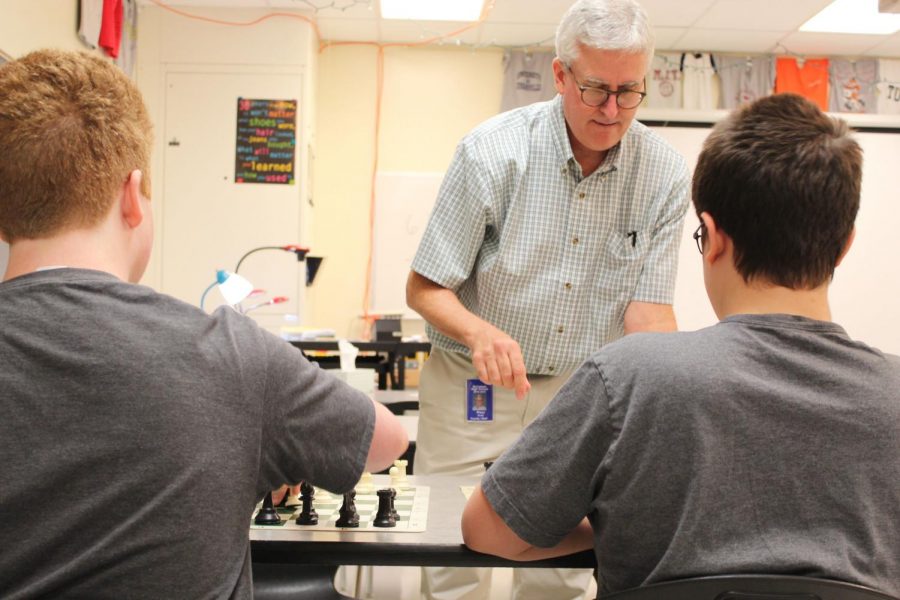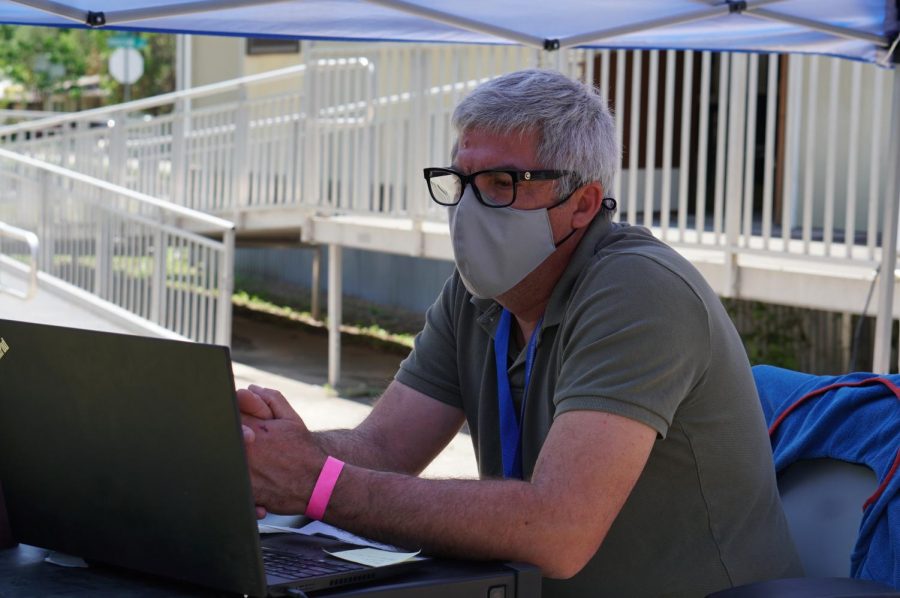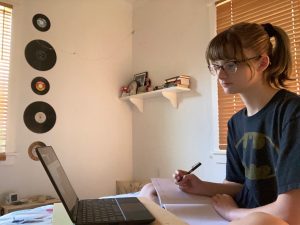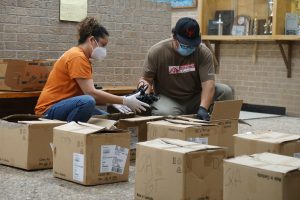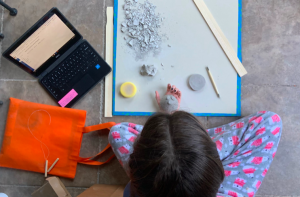Their struggle recognizes ours
Three McCallum teachers share their experiences of working to adapt to virtual teaching over the past year
Language arts teacher Eric Wydeven “attends” a virtual department meeting on Tuesday. Even teacher gatherings have had to move to Zoom during the pandemic that has now stretched beyond a year and left many teachers, like their students, feeling isolated and alone.
April 23, 2021
For students and teachers alike, the past 13 months have posed continuous challenges as we adjusted to and grew weary of our isolated and remote way of living and learning. For many teachers, their jobs have completely changed form, with human contact and communication extremely limited, and student motivation at an all-time low. And now, just a bit over a year since our last wholly in-person class, while the attendance rate rises in-person and Principle Griffith encourages students to return towards the end of the school year, we look back at a year in lockdown with three McCallum teachers.
For AP English III and film analysis teacher Eric Wydeven, the “bread and butter” of his courses, interaction and discussion with his students, is gone.
“I miss bodies and I miss faces, and I miss the kinds of human interaction that make this job really fun to do. So in that, it has really been emotionally difficult,” said Wydeven, who happens to be one of my teachers. “I’m here to form relationships with you people and as you see in our class, nobody has got their camera on and people are reluctant to communicate.”
In class, Wydeven conducts discussions about the rhetorical devices in the assigned readings, social and historical ties in the works of literature or just any observation at all. Wydeven notes that he has a couple of classes where it’s more like “business as usual” and engaging discussions happen.
“Even if I’m not seeing faces, I’ve got a lot of stuff in the chat and a lot of people, with faces or without, contributing to those discussions.”
Similarly, for math teacher Scott Pass, one of the most important parts of teaching pre-calculus, multivariate calculus, and first-year algebra are the relationships he forms with his students.
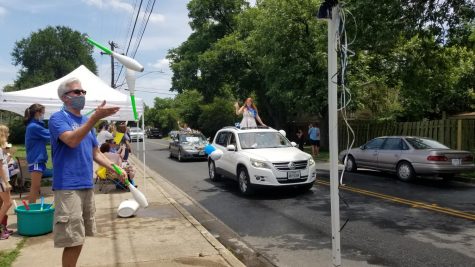
“For me, education has a lot to do with personal connections with students,” he said.
Even in the Zoom room, Pass tries to get to know students as individuals by calling on students and asking questions about their day or what plans they have for the weekend, sparking a conversation.
But developing these relationships virtually remains a challenge.
“When there’s downtime in class, I can ask kids what they like to do, I can ask kids what music they like, I can just get to know them, and that’s been taken away from me. It just doesn’t work as well virtually. So the connection to the student for me personally has been the most difficult thing.”
Biology teacher Nicole Sorto says that teaching without seeing her students’ faces is just not the same. “Honestly, I do not find any satisfaction teaching over Zoom,” Sorto said. “Teaching for me is about personal relationships and having fun teaching the contents and seeing the understanding in my kids’ faces.”
Instead, she says, Zoom makes her feel unlike herself.
“I feel more awkward than I have ever felt in my life. I have never been shy or self-conscious, but this is all so unnatural.”
She has found that teaching online has made it harder to manage her time. She finds it harder to “shut down,” leading her to put in grades and designing the curriculum at two in the morning.
“I’ve always been really good about keeping my work life at school–very little or no grading at home–but there is no line for when to start or stop.”
Both Wydeven and Pass have been struggling with the slower pace of a virtual curriculum.
“Normally in this AP class we read six novels and a major piece of nonfiction, and here we are now down to two,” Wydeven said, “so, I’ve been struggling a lot as a teacher because I don’t feel like I’m doing a good job.”
Pass worries about the long-term impact of the shortened curriculum.
“We are only able to do a small percentage of what we were able to do previously,” he said. “ Students are not aware of this. Maybe you get super high grades, and it looks like everything is great, but if you think that you’re only learning 30 to 60% of what we learned last year; even if you’ve done well with what we’ve learned, you’re falling behind.”
Pass points out that this has been a loss that’s impacted everyone; no matter the school or the district, it’s a shared experience.
“That’s actually a good thing,” he said. “It isn’t just us.”
For these three teachers, this pandemic year has forced them to adapt quickly and open up what Wydeven calls their “bag of tricks.”
Pass had an old math teacher share this wise advice with him: “I know it is going to be hard, there are going to be a lot of bad things, but watch for things that are good.”
Among those good things, Wydeven says, is technology.
“I’ve learned so much about technology and how to use Blend, and some of these platforms towards my educational ends,” he said. “So if there’s anything good it’s my growth as a teacher. And now I have a larger bag of tricks to use when we’re back in person.”
Pass agrees that learning new tools will be enriching in the long term.
“I think in education, having a variety of tools is good, and definitely in this environment, I’ve learned a whole variety of tools. Some of them I don’t like, but overall it’s been positive to try the new things that I’ve learned.”
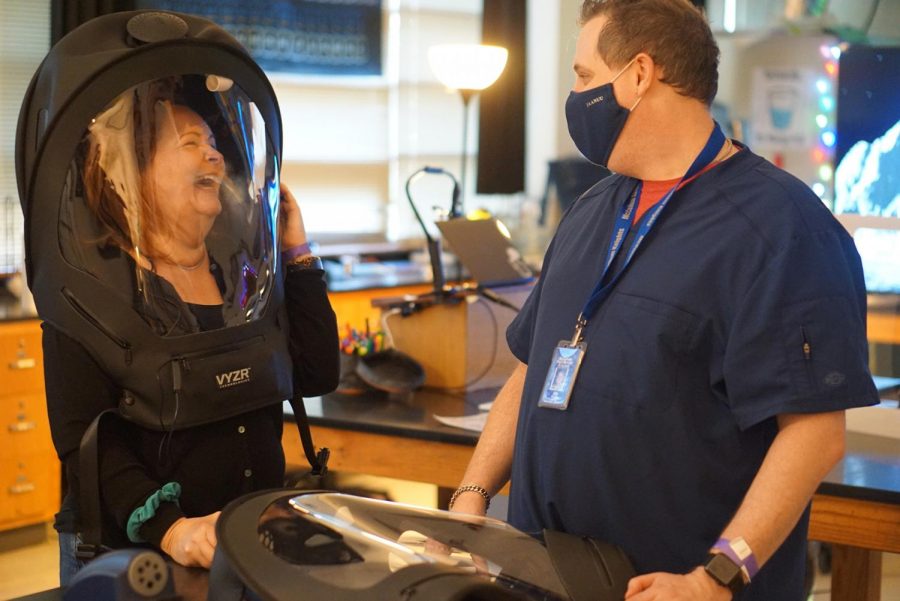
But technology isn’t the only thing they’ve taken away from this difficult year.
“I’m a different human being than I was 365 days ago,” Wydeven said.
And the appreciation goes beyond the importance of in-person teaching.
“I just feel like I’m more in tune with human beings. And you kids as human beings, even though we’re so separated from one another. I say. ‘Oh, I love you guys!’ and I really mean it. There’s something so valuable about our humanity together.”
Pass also observes a deeper appreciation for our common humanity.
“We are better in community than we are alone.”
With the prospect of going back to school imminent, he says “We need to appreciate the time we have together. Even if it is just appreciating being in a pep rally when we can be together. I knew it was important, but it is everything really. You need to be part of a community that you can really share with [others].”
Looking back on last year, I asked the teachers what advice they would have given to themselves as they headed into lockdown last March.
“I think I’d tell myself ‘It’s going to be OK.’”
Mr. Pass said at times he felt like it was too hard, and that he wanted to quit. So he’d tell himself to try “not to take it too seriously and try to help kids, and it will work out pretty well.”
Sorto sums it up with “Buckle up Buttercup.”
All three teachers feel like students have shown resilience as well as vulnerability.
“I really appreciate those students that communicate and talk with me,” Pass said. “Teachers are human too, so that always helps.”
He appreciates when students are honest.
“I can’t tell you how many times I have had a student say to me ‘OK Mr. Pass, I feel bad that I’m three weeks behind, but I am three weeks behind, and I’m like ‘You know what, let’s get together.’”
Wydeven agrees.
“I think that students have demonstrated their resiliency and their willingness and ability to adapt when the sh*t hits the fan,” he said.
But he also appreciates the vulnerability.
“I’ve really appreciated the people who have been willing to tell me ‘’I can’t do this assignment right now because I’m a mess. I’m anxious, and I’m depressed.’”
Pass also wants students to know he appreciates the work they are doing.
“I don’t get to say this as much virtually, but I do appreciate your work a lot, and it’s hard.”
Sorto thinks similarly.
“I want you to do well, understand the material and have fun,” she said. “If there is any way that I can be of support, I will do my best to help.”
Wydeven wants students to know “I genuinely care about them, as students, as human beings, as people engaging with these ideas. My struggle recognizes their struggle.”
